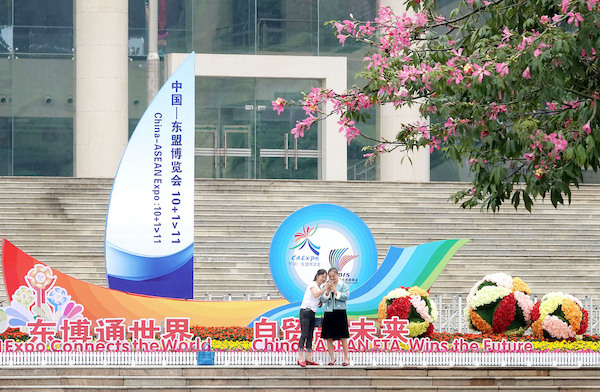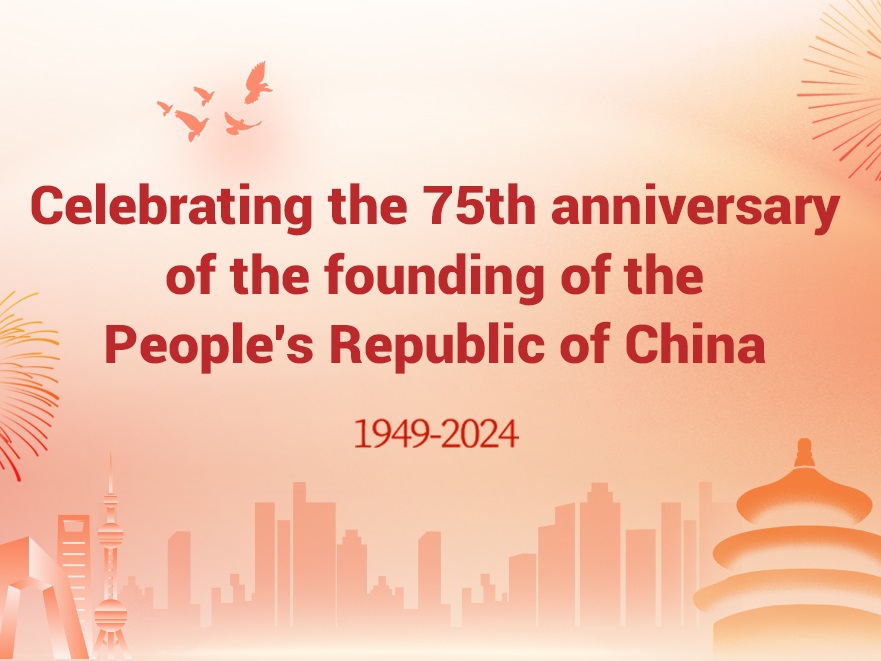Beijing, ASEAN to enhance ties

Pedestrians take photographs of a decoration for the 17th China-ASEAN Expo in Nanning, capital of the Guangxi Zhuang autonomous region. [Photo by YU XIANGQUAN/FOR CHINA DAILY]
China's Jan-Sept direct investment in region surged 76.6 percent to $10.72b
Companies from China and the Association of Southeast Asian Nations are ready to explore more investment opportunities in a range of areas following the recent signing of the Regional Comprehensive Economic Partnership, officials and business leaders said on Friday.
While both sides look forward to the deal's early implementation, they said many opportunities also come from the tangible development of regional economic integration with the Belt and Road Initiative, China and ASEAN's complementary industrial structure and their growing bilateral trade value in both goods and services.
The remarks were made during the ongoing 17th China-ASEAN Expo in Nanning, the Guangxi Zhuang autonomous region.
Ning Jizhe, vice-minister of the National Development and Reform Commission, said since China and ASEAN jointly released a statement on production capacity cooperation in 2016, their enhanced industrial and value chains have helped businesses on both sides better cope with uncertainties caused by the COVID-19 pandemic, protectionism and the global recession.
Apart from the fast development of big-ticket infrastructure and industrial park projects such as the China-Laos Railway, Indonesia's Jakarta-Bandung high-speed railway and China-Singapore Suzhou Industrial Park, Ning said that the two parties should give full play to their comparative advantages and enrich regional industrial chains in key sectors such as infrastructure, manufacturing, agriculture and healthcare in the next stage of partnership.
Despite slowing global trade, economic recession and serious travel disruptions, China's direct investment in ASEAN markets surged 76.6 percent on a yearly basis to $10.72 billion in the first three quarters. The top three investment destination countries were Singapore, Indonesia and Laos, said the Ministry of Commerce.
Khamchan Vongseneboun, Lao deputy minister of planning and investment, said business ties between China and ASEAN are expected to become more well-rounded and pragmatic after the signing of the RCEP, the world's largest trade deal. Her country encourages companies from both China and other ASEAN members to invest in its transportation, services and agricultural sectors, and the government will in turn offer preferential tax policies.
Owing to the huge gaps in levels of economic development between ASEAN economies, Xu Zhiyu, president of global government affairs at Shenzhen, Guangdong province-based Huawei Technologies Co Ltd, said the Chinese company will deploy more resources to help certain ASEAN countries like Laos build more telecommunication infrastructure facilities to accelerate modernization, as well as provide related training and educational opportunities for local talent.
Raja Dato' Nushirwan Zainal Abidin, Malaysian ambassador to China, said he hopes a production capacity cooperation plan will further enhance teamwork in the area of advanced technologies, especially 5G, artificial intelligence, robotics, aerospace and pharmaceuticals between Malaysia and China.
Gao Yan, chairwoman of the Beijing-based China Council for the Promotion of International Trade, said China will continue to promote economic development through industrial upgrading to complement the production and consumption needs of ASEAN economies and China to achieve sustainable development and shared prosperity.
Despite the global economic downturn, Lim Ming Yan, chairman of the Singapore Business Federation, said that Singapore businesses continue to show unwavering interest in the Chinese market. With Singapore being one of the world's major infrastructure, financial, legal and logistics hubs, its companies are well positioned, Lim said.


